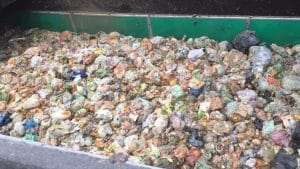

News
The importance of managing food waste in cities

By David Newman, President of the World Biogas Association
Ahead of the launch of a new international report by the World Biogas Association (WBA) and the C40 Cities Food, Water and Waste Programme on urban food waste management, WBA President David Newman sets out why it’s critical for cities around the world to manage their food waste sustainably.
The last ten years have seen a marked increase in the recognition of food waste as a critical global environmental issue. Not only has the issue of wasted food become an ethical one in a world where approximately 800 million people suffer from hunger, but the enormous environmental impacts of producing food that is then discarded can no longer be overlooked. As the global population grows and urbanisation increases, more food is being produced and wasted, creating severe environmental and public-health consequences particularly in urban areas, which are projected to home as much as 70% of the global population by 2050.
The challenge and opportunity
Poor management of food waste causes the loss of natural resources, human health issues, pollution of rivers and seas, the generation of methane emissions from dumps and landfills, and a missed opportunity to recover valuable energy, organic matter, nutrients and water contained in food waste. Taken together, the scale of these combined impacts means that meeting the Paris Agreement and the UN Sustainable Development Goals will simply not be possible without sustainable management of urban food waste.
Cities around the world are expressing a need for help on food waste as one of the largest environmental problems they face. As one of the low-hanging fruits available to reduce greenhouse gas emissions globally, collecting and treating food waste does, however, create opportunities as well as solving problems. Our calculations show, for example, that treating the world’s 1.6 bn tonnes of food waste would be equivalent to taking all the cars in the EU off the road.
With countries and cities racing to make their Nationally Determined Contributions under the Paris Agreement by 2020, there’s no time to lose in communicating the importance and opportunities of this issue.
The best treatment
There are a number of different ways of treating food waste, but by far the best from an environmental point of view is anaerobic digestion (AD), a natural process that uses microbes to break down the food waste and produce a renewable biogas (which can then be used to produce heat or electricity) and a nutrient-rich digestate by-product that can be used as an organic fertiliser.
The AD process also helps reduce volumes of waste and odours from waste, and closes the loop through returning digestate back to soil. The particular contribution of digestate is greatly underrated, with soil quality not yet receiving the legislative attention it deserves. We have seen in arid areas of the world how digestate contributes nutrients and moisture to soil, enabling a significant increase in yields, farm incomes, stability of communities, and hunger and poverty reduction.
At the moment, the costs of implementing AD systems remain relatively high, making it a difficult choice for treating food waste in low-income countries in particular. However, costs are gradually falling, and there’s a strong focus in the biogas industry to bring about a step change in the efficiency of AD processes to help support this trend.
What cities and municipalities can do
Systems for collecting and treating food waste are currently highly dependent on local circumstances. There are no technical barriers to implementing effective food waste collection and treatment – what is required is investment and political will to do the right thing. The climate change and waste management gains made from separate collection of food waste far outweigh the costs, but the political will to raise the initial cost to achieve those benefits has yet to be shown in many countries.
Cities that do have separate collections need to look at the quality of their collection systems to reduce contamination of food waste to ensure that clean materials are returned to the soil through digestate. As with all solutions, it’s important that AD is implemented intelligently, with a good understanding of local circumstances such as feedstocks, technical capacity, and legislative drivers; this will help ensure that it can deliver maximum return on investment.

Finding out more
To support cities around the world in implementing sustainable food waste management systems, WBA has partnered with the C40 Cities Food, Water and Waste Programme to create a new report, ‘Global Food Waste Management: A Practical Guide for Cities’. The report, which will be launched in Rotterdam in May, is the first to put together in one place information on how to prevent, collect and treat food waste, as well as offering suggestions for using of the outputs of the treatment process and setting out the policy and economic levers that are needed to attract investment.
While primarily aimed at policy makers in cities, and particularly those in low-income countries where there are often low levels of waste treatment, it is intended to also be a useful resource for food waste operators, consultants, researchers and non-governmental organisations.
Following the launch of the report, we’ll also be discussing its findings and running a series of workshops on urban food waste management at UK AD & World Biogas Expo 2018, the world’s largest dedicated biogas tradeshow, which is taking place at the NEC in Birmingham, UK, on the 11th-12th July. The show is free to attend, and will bring together food waste recycling experts from around the world.
With food waste rising up the global agenda and such huge opportunities to secure environmental, social, and economic benefits through its sustainable management, we’ll have plenty of food (waste) for thought.
You can find out more about UK AD & World Biogas Expo 2018 and register your free place here.
You must be logged in to view the rest of the content on this page.
To request a login and password, contact us at info@worldbiogasassociation.org
If you have login details, please enter them below.

